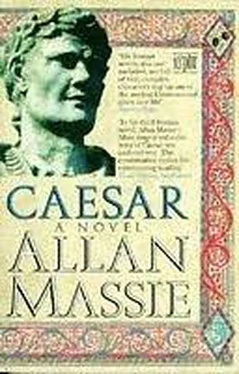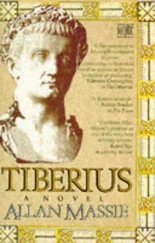Allan Massie - Caesar
Здесь есть возможность читать онлайн «Allan Massie - Caesar» весь текст электронной книги совершенно бесплатно (целиком полную версию без сокращений). В некоторых случаях можно слушать аудио, скачать через торрент в формате fb2 и присутствует краткое содержание. Жанр: Исторические приключения, на английском языке. Описание произведения, (предисловие) а так же отзывы посетителей доступны на портале библиотеки ЛибКат.
- Название:Caesar
- Автор:
- Жанр:
- Год:неизвестен
- ISBN:нет данных
- Рейтинг книги:3 / 5. Голосов: 1
-
Избранное:Добавить в избранное
- Отзывы:
-
Ваша оценка:
- 60
- 1
- 2
- 3
- 4
- 5
Caesar: краткое содержание, описание и аннотация
Предлагаем к чтению аннотацию, описание, краткое содержание или предисловие (зависит от того, что написал сам автор книги «Caesar»). Если вы не нашли необходимую информацию о книге — напишите в комментариях, мы постараемся отыскать её.
Caesar — читать онлайн бесплатно полную книгу (весь текст) целиком
Ниже представлен текст книги, разбитый по страницам. Система сохранения места последней прочитанной страницы, позволяет с удобством читать онлайн бесплатно книгу «Caesar», без необходимости каждый раз заново искать на чём Вы остановились. Поставьте закладку, и сможете в любой момент перейти на страницу, на которой закончили чтение.
Интервал:
Закладка:
Caesar called his chief lieutenants together to consider how the matter should be handled. Incidentally, since I have often heard people who knew nothing of his working methods declare that he acted always on his own judgment, paying no heed to the opinions of those around him, I must point out that this wasn't the case. Quite the contrary indeed; he invariably paid close attention to what others thought, even if he also liked to make it seem that the eventual decision was entirely his. That was his nature, and that was how he liked to work.
On this occasion Antony's advice was clear. (I don't know why I say "on this occasion", since Antony never lacked confidence in his own opinion — at least till Caesar challenged it, when he would backtrack with the speed of cavalry in flight.)
"Caesar," he said, "we have no shortage of loyal troops still under discipline. We should march out of Rome and confront the buggers. Make it clear you won't stand for any nonsense, but are ready to fight them if need be. That will sort them out. We can all be certain that they won't engage in battle against you yourself."
That advice was typical of Antony: vigorous, flattering to Caesar, and thoughtless. I looked round the table and noticed several heads nod in agreement. They weren't heads I would have trusted to plan an excursion to the country.
Caesar gave no sign whether he approved this plan or not.
Caius Cassius, a recent adherent to our party (he had fought in the Pompeian army at Pharsalus) looked grave. Some may have been surprised that he had been invited to attend this council, but it was Caesar's policy to bind reconciled enemies as tightly as possible to his cause and person. Now Cassius spoke, anxious, as was natural enough, to make an impression.
"I have no doubt that my friend Antony has considered the matter carefully," he said. "He knows these legions, and may have judged wisely. Yet it occurs to me that he may have overlooked what I would call the political aspect. There is reason to believe, is there not, that this mutiny has been fomented by agitators?"
"For myself, I detect the hand of Labienus," Caesar said.
"Thank you, Caesar. I am grateful to have my suspicions confirmed. Now what do I mean by the political aspect? Simply this: if we march out against them, Caesar's enemies will take heart. They will say that his legions are divided against each other. They will say his party is split. They will therefore attract new adherents."
"Bugger new adherents," Casca said. "I'll tell you something more dangerous still. If we march against them, they won't stand their ground, but they won't surrender either. Antony is right in saying they won't dare to face you in person, Caesar. But they will withdraw in good order, they're soldiers dammit, whom we have trained. We know what manner of men they are. We know their pride. And what then? They will believe that their cause can only be saved — their lives even — if they retire and ally themselves to our enemies. It's too great a risk, Caesar."
"So what should we do, Casca, if you reject our dear Antony's proposal?"
"Buggered if I know," Casca said.
"Well, Mouse?" Caesar turned to me. "Have you words of wisdom to offer?"
"I should hesitate to call my opinion wisdom, but it seems to me that you should do nothing which might suggest to them that you recognise that they are not under your orders."
"By Hercules," Antony shouted, "what sort of nonsense is this? They've mutinied, Mouse, in case you haven't noticed. That means that they have defied orders, rejected orders. Or don't you know what the word 'mutiny' means?"
"Oh yes," I said, "I think I do. And if you will allow me to repeat what I said, and this time listen carefully, Antony, I suggested that Caesar should not act in such a manner as to let the mutineers believe that he recognises that they are not under his orders. I mean by that, Caesar, that you take the initiative, not by confronting them, but by issuing the sort of order which they will find quite easy to obey…"
"I'm still lost," Antony said.
"Never mind, dear," Casca said. "Mouse is right, Caesar."
I have recounted this conversation in some detail because in the subsequent report which Caesar gave to the Senate, he allowed it to be understood that the plan by which the mutiny was quelled originated with him. I owe it to my dignity to draw the attention of posterity to my part in its defeat. Indeed, though I don't deny that Caesar delivered the final masterstroke, everyone who attended that council knows very well that the grand design was my work.
So word was sent to the mutineers that they could enter the city, and camp in the Field of Mars, so long as they first laid down their arms. (The gates of the city were of course well-guarded by loyal troops.) They obeyed this instruction to the extent that I had thought probable; that is to say, they carried only their swords with them. That terrified the citizens — no bad thing in itself, I thought.
Caesar was angry when I collected him from his house. Fortunately, his anger was controlled. He explained to me that he was revolted by the disloyalty, self-will and stupidity of the men.
"We have been through so much together," he said. "We are part of the same body. Don't they understand that, if they are to command and I am to fall in with their wishes, the whole nature of the bond between us will be tarnished, even destroyed? I have no patience with their greed and insolence."
"Very well, Caesar," I said, "but when you address them, be cold, not warm."
"I shall be cold as a night in the mountains of Helvetia," he replied.
We arrived in the Field of Mars and made our way to the dais which had been erected. Caesar took his seat. For a few minutes he paid no attention to the men swarming beneath us, but spoke only to me and a few others around him. I took stock of the situation. Now that my plan was approaching fruition, I felt nervous for the first time. It was after all possible that it would not work, and in that case things could turn very nasty indeed. There might even be a general massacre.
When Caesar at last lifted his head, looked at the troops and spoke, his voice was bored. He asked to hear their complaints. He spoke as if he had never previously seen these men with whom he had fought throughout Gaul and at Pharsalus. It was,
I must confess, a marvellous piece of theatre: and it disconcerted them.
Nevertheless, after a pause, while they waited to see who would have the courage to speak first, the complaints came fast and thick. Speech tumbled over speech as they told of their wounds, their hardships, what they had suffered in his cause, the great deeds they had accomplished, the friends they had lost, the rewards they had expected and been denied, their desire to be demobilised.
The speeches went on too long. The mood was growing more restive. Still Caesar gave no sign that he had heard.
Someone shouted: "We've torn our guts out for you, Caesar."
One legionary pushed forward, clambered halfway up the platform before he was stopped. He tore a patch off his left eye, revealing a horrid vacancy.
"I lost this at Alesia, and still they wouldn't give me my discharge. What do you say to that, Caesar?"
Caesar looked up. He raised a hand. There was silence.
"Very well," his voice seemed unconcerned, an actor's voice. "I have understood what you want. You can all be demobilised immediately. Leave your swords with the guards as you disperse. As for money, you all know Caesar. You can rely on me for every penny you are due and every penny you have been promised. Give your names and the amount you claim to the quartermaster. You'll have to wait, though, till I return from Africa to get settlement in full. I'd counted on you for that campaign. Now it'll have to be fought with other legions. They'll be the ones which will take part in my Triumph when I return. I think that's everything."
Читать дальшеИнтервал:
Закладка:
Похожие книги на «Caesar»
Представляем Вашему вниманию похожие книги на «Caesar» списком для выбора. Мы отобрали схожую по названию и смыслу литературу в надежде предоставить читателям больше вариантов отыскать новые, интересные, ещё непрочитанные произведения.
Обсуждение, отзывы о книге «Caesar» и просто собственные мнения читателей. Оставьте ваши комментарии, напишите, что Вы думаете о произведении, его смысле или главных героях. Укажите что конкретно понравилось, а что нет, и почему Вы так считаете.












